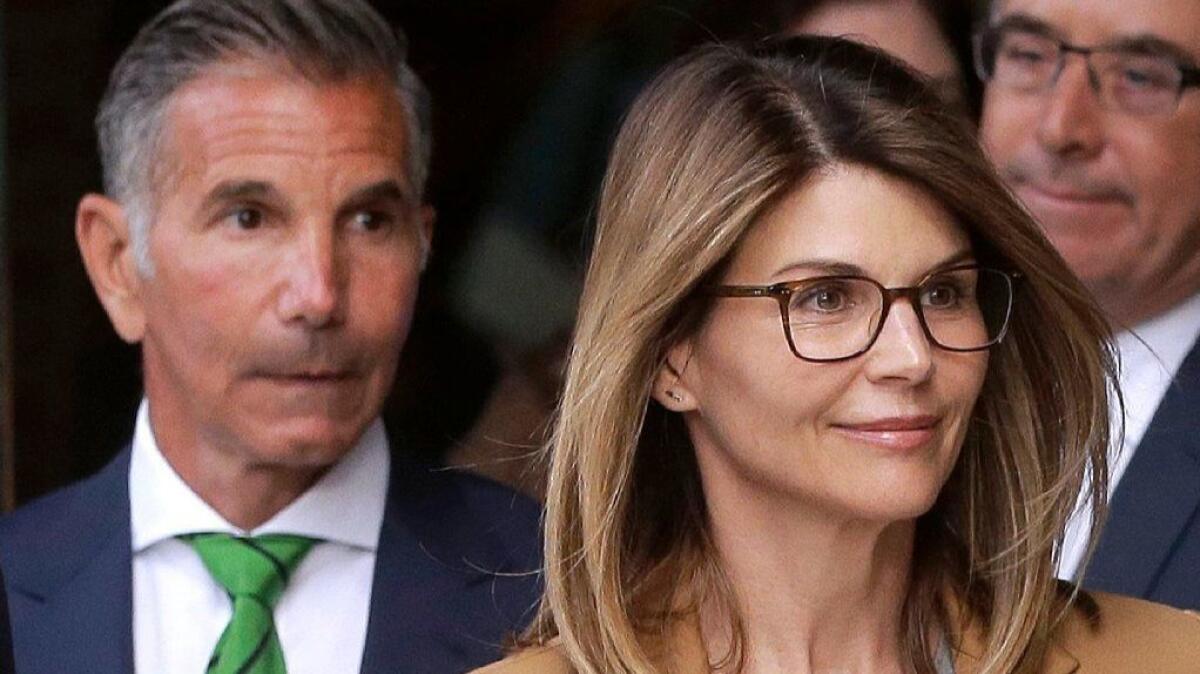Lori Loughlin wants FBI reports, says they would show her belief payments were legitimate

Prosecutors are withholding evidence that would show Lori Loughlin and her husband, Mossimo Giannulli, believed the $500,000 they paid to a college admissions consultant’s charity was a legitimate donation, not bribes that would ensure their daughters were admitted to USC as phony rowers, the couple’s attorneys wrote in a court filing.
The couple’s legal team, led by former Enron prosecutor Sean Berkowitz, is demanding the government turn over FBI reports, known as 302s, that memorialized agents’ interviews with the consultant at the center of the scheme, William “Rick” Singer.
Those reports would show where Singer told his clients their six-figure payments would end up, Berkowitz wrote. In the case of Loughlin and Giannulli, who have been charged with conspiracy to commit fraud, money laundering and bribery, the couple thought their money “would go to USC itself — for legitimate, university-approved purposes — or to other legitimate charitable causes,” their lawyers wrote.
Prosecutors from the U.S. attorney’s office in Boston have so far refused to disclose the FBI reports, Berkowitz wrote. They have provided only a summary of Singer’s discussion of his dealings with Loughlin and Giannulli, he said.
The summary is appended to Berkowitz’s filing. Singer explained to the couple that to have their daughters admitted to USC as recruited coxswains, they “would need to write a $50,000 check to Donna Heinel at USC and pay an additional $200,000 through the KWF,” the summary says. KWF is short for Singer’s charity, the Key Worldwide Foundation.
Prosecutors say Heinel, then a high-ranking administrator at USC, presented the couple’s daughters to an admissions committee as elite rowers, which they were not. Heinel has been fired by USC. She has pleaded not guilty to conspiracy to commit racketeering, bribery and fraud.
But to hear their lawyers tell it, Loughlin and Giannulli believed they were sending money to a charity in good standing with the Internal Revenue Service, and that the money would “support programs geared toward helping underprivileged children” and “legitimate university activities” at USC.
“Giannulli and Loughlin will help establish their innocence by showing that they understood both sets of payments to be legitimate donations,” Berkowitz wrote, “and did not understand or intend that either set of payments would be used to directly or indirectly bribe Heinel.”
In pleading guilty to four felonies in March, Singer admitted that despite its avowed mission of supporting “underprivileged children,” his foundation had little function beyond allowing his clients to make tax-deductible payments that Singer then parceled out in bribes to college coaches and test administrators.
Loughlin and Giannulli’s attorneys also want information concerning USC’s knowledge of Singer’s operation, which shuttled more students into the Los Angeles school than any of the dozen or so elite colleges to which Singer peddled illegal access.
“If, for example, USC knew of Singer’s operation and accepted donations to the university from Singer’s clients as legitimate, then not only was there no bribery at USC, but also no fraud conspiracy at all,” Berkowitz wrote.
He pointed to a recent indictment that suggests more USC employees were involved in Singer’s scheme than the three coaches and an administrator who have been charged with racketeering, fraud and bribery. “There is good reason to believe that numerous USC officials were aware of Singer’s operation,” Berkowitz said.
Included in the government’s summary of Singer’s interviews are glimpses of his dealings with Loughlin and Giannulli, perhaps the most well-known names implicated in the scandal.
Singer told FBI agents that “Lori Loughlin was in charge and told the couple’s daughters that they needed to do better in high school.”
Agents have also interviewed Philip Petrone and Jacqueline Landry, co-director of college counseling and head of school, respectively, at Marymount High, where Loughlin and Giannulli’s daughters went to school.
“When Philip Petrone began asking questions about why Olivia was admitted to USC as a recruit to the crew team (given that she did not participate in crew), Singer told Giannulli that Petrone could mess things up and advised Giannulli to speak with Petrone,” the summary says.
Petrone told agents that Giannulli asked him if he “had told USC that his daughters were bad candidates”; he said he had not. Giannulli then told Petrone that his younger daughter, Olivia, was in fact a coxswain and that he would tell USC as much, according to the summary.
Landry told agents that after Giannulli informed her that Olivia rowed crew at a private club, she assured him “Marymount would not interfere with Olivia’s application to USC,” according to the summary.
More to Read
Sign up for Essential California
The most important California stories and recommendations in your inbox every morning.
You may occasionally receive promotional content from the Los Angeles Times.










